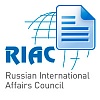Publications Review 24.11.2014. APEC summit, G20, Ukrainian crisis, Berlin wall, Kosovo, Cybersecurity, Globalization, Global Oulook for 2015
In
Login if you are already registered
(votes: 1, rating: 1) |
(1 vote) |
November 2014 has been full on international events. First, the world, especially European part of it, celebrated 25th anniversary of the fall of Berlin wall. Then world leaders met on several occasions: during the APEC summit, then shared coffee in sunny Brisbane in Australia on G20. The headlines are still bursting with interpretations and speculations on what has been achieved and what opportunities have been thrown away. This digest features some essays and opinions on these recent events. And not only. Find here: APEC, G20 economies and green management, Ukrainian crisis, the fall of the Berlin wall, Kosovar stalemate, building cyber confidence, new perception of globalization, a new wave of emerging countries and Global Outlook for 2015.
Rising Powers Initiative issues a Policy alert with comments from Asian powers on the APEC summit. Commentaries follow from China, Japan, South Korea, Russia and India. The majority of them focus FTAAP perspectives, future of Sino-Japanese relations, bilateral free-trade agreements. This is a very brief and comprehensive sum up of the APEC summit with bullet points to facilitate grasping the gist of the event.
It seems that Ukraine crowns this year in every possible way. Here is yet another of many to come analytical pieces on whether a peace between Ukraine and Russia is feasible. What are the main obstacles and objections standing in the way of a thorough and comprehensive dialogue which could lead to a working agreement? This is one version among many on IISS webpage.
A memorable piece on Modern Diplomacy on how humankind forgets great achievements and turns history into a completely false and dark direction. The author of the piece analyses mentality and human perceptions of historic hallmarks which close one epoch and open a new one. He makes a link between the fall of the Berlin wall and, surprisingly, 9/11. Enjoy.
A change in the EU leadership has raised questions regarding  how the hard points in the EU inner and foreign policy will be dealt with. One of them is the Kosovar matter. Belgrade center for security studies provides wider public with a piece that gives some hints on how the new Head of European diplomacy Federica Mogherini should manage this painful and sensible issue.
how the hard points in the EU inner and foreign policy will be dealt with. One of them is the Kosovar matter. Belgrade center for security studies provides wider public with a piece that gives some hints on how the new Head of European diplomacy Federica Mogherini should manage this painful and sensible issue.
An occasional paper under the auspices of the International Centre for Defense studies in Tallinn gives a well-based essay on Advancing confidence building in cyberspace. The core argument is that the future of cyber confidence lays solely in fragmented small groups of aligned neighborhood states, not in the hands of the international structures, like the OSCE. The latter fail continuously in providing a working mechanism of cyber confidence while the former ones may be successful in doing so.
 A little bit of green management. ODI focuses another interesting
A little bit of green management. ODI focuses another interesting
report on G20 countries and how they manage their subsidies for oil, coal and gas exploration. Findings show that by providing subsidies for fossil-fuel exploration, the G20 countries are creating a ‘triple-lose’ scenario. Slightly complicated and for those who are keen on the topic, this report is a good example of advanced analysis.
Elcano Global Presence Index is a long and multilayer report on  the perception of globalization processes. The report distinguishes between power and presence, thus turning the angle of the analysis into a new direction. The most intriguing part is the prognosis for 2030. Click the link and explore how you are connected to the farthest corners of the world.
the perception of globalization processes. The report distinguishes between power and presence, thus turning the angle of the analysis into a new direction. The most intriguing part is the prognosis for 2030. Click the link and explore how you are connected to the farthest corners of the world.
Fondation pour L’innovation politique in Paris gives a what seems at first sight traditional paper of the emerging countries. However, this is not the old set of countries we are used to. Bangladesh, Ethiopia, Nigeria, Vietnam and a couple of others take part in this range. The author gives an economic basis for this choice. Have a look. And it is in English.
Digest Editor: Maria Gurova, RIAC Program Assistant
(votes: 1, rating: 1) |
(1 vote) |










